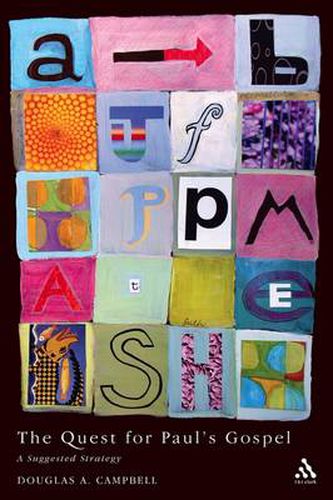Readings Newsletter
Become a Readings Member to make your shopping experience even easier.
Sign in or sign up for free!
You’re not far away from qualifying for FREE standard shipping within Australia
You’ve qualified for FREE standard shipping within Australia
The cart is loading…






Douglas Campbell gives a clear account of why much current description of Paul’s theology, and of his gospel and of his theory of salvation, is so confused. After outlining the difficulties underlying much of the current debate he lays out some basic options that will greatly clarify the debate. He then engages with these options and shows how one offers far more promise than the others, sketching out some of its initial applications. Campbell then shows in more detail how another option – the main alternative, and the main culprit in terms of many of our difficulties – can be circumvented textually, in a responsible fashion. That is, we see how we could remove this option from Paul’s text exegetically, and so reach greater clarity. Finally, he concludes with a ‘road-map’ of where future, more detailed, research into Paul needs to go if the foregoing strategy is to be carried out thoroughly. Campbell believes that by utilising this strategy Paul’s gospel will be shown to be both cogent and constructive. This is volume 274 in the Journal for the Study of the New Testament Supplement series.
$9.00 standard shipping within Australia
FREE standard shipping within Australia for orders over $100.00
Express & International shipping calculated at checkout
Douglas Campbell gives a clear account of why much current description of Paul’s theology, and of his gospel and of his theory of salvation, is so confused. After outlining the difficulties underlying much of the current debate he lays out some basic options that will greatly clarify the debate. He then engages with these options and shows how one offers far more promise than the others, sketching out some of its initial applications. Campbell then shows in more detail how another option – the main alternative, and the main culprit in terms of many of our difficulties – can be circumvented textually, in a responsible fashion. That is, we see how we could remove this option from Paul’s text exegetically, and so reach greater clarity. Finally, he concludes with a ‘road-map’ of where future, more detailed, research into Paul needs to go if the foregoing strategy is to be carried out thoroughly. Campbell believes that by utilising this strategy Paul’s gospel will be shown to be both cogent and constructive. This is volume 274 in the Journal for the Study of the New Testament Supplement series.